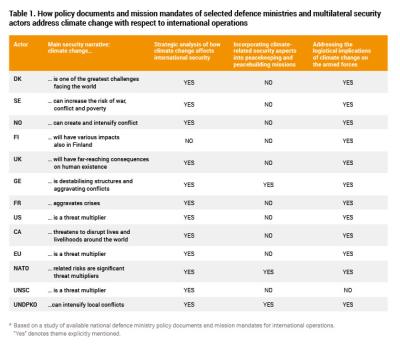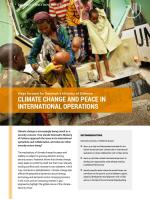Climate change and peace in international operations
Climate change is increasingly being raised as a security concern. How should Denmark’s Ministry of Defence approach the issue in its international operations and collaboration, and what are other security actors doing?
Denmark’s Ministry of Defence should:
■ Draw up a clear and demarcated mandate for the Danish armed services’ climate role in international operations in close collaboration with civilian actors.
■ Team up with like-minded international partners to develop joint approaches under already existing multilateral frameworks.
■ Identify specific tasks where the armed forces can contribute on the ground, such as disaster support, capacity development and alignment with civilian actors in the field of Environmental Peacebuilding.
The implications of climate change for peace and stability is subject to growing attention among security actors. Research shows that climate change rarely leads to conflict by itself, but that it can intensify existing conflicts and increase human disasters, which may contribute to destabilisation. Climate change also affects the geopolitical dynamics around energy, technology and territorial control. Emerging tensions in the Arctic and an increasing interest in geo- engineering highlight the global nature of the climate– security nexus.
This brief reviews how climate change is being addressed by selected security actors and provides recommendations for how Denmark’s Ministry of Defence should approach the issue in its international collaboration and operations.
APPROACHES OF SELECTED SECURITY ACTORS
Denmark’s NATO allies, Nordic partners and selected security organisations do to some extent address climate change in their defence policies and mission statements, with a focus on climate change as a threat multiplier (Table 1). Three overall areas of activity are evident:
Strategic analysis of how climate change affects international security
Most defence policy documents reflect a growing attention to climate-related security dynamics, and how to deal with them at the strategic level. Denmark, the US and Canada have emphasized the Arctic. The UK, Sweden and France have raised climate change in UN Security Council discussions. Germany has pushed an agenda in the EU and UN to include climate-sensitivity in military operations. NATO is working on common risk governance approaches to climate change and has urged allies to recognise climate risks in their security policies. The implications of climate change are also being addressed in forums like the Munich Security Conference and the International Military Council on Climate and Security.
Most defence policy documents reflect a growing attention to climate-related security dynamics, and how to deal with them at the strategic level.
It is also clear that much uncertainty persists, and implementation of policy narratives remains scattered. For example, Danish and French defence policies both emphasize the significance of climate change, yet their operations do not incorporate climate change aspects in, for example, the Sahel, where it is a major issue. Nor is climate change reflected in any of the eighteen on-going EU Common Security and Defence Policy missions.

Incorporating climate-related security aspects into peacekeeping and peacebuilding missions
The UN Department of Peacekeeping Operations (UNDPKO) is among the most experienced security actors engaging environmental and peace issues. UNDPKO collaborates with non-military UN agencies UNEP and FAO to develop insights and pre- deployment training in so-called Environmental Peacebuilding. The latter approach applies collaborative management of, for instance, water resources and adaptation to climate change. For example, recent peacekeeping missions in Mali and the Central African Republic have addressed violent land and water conflicts by supporting civilian conflict management and risk analysis.
Experience from involving peacekeeping missions in climate related work show that there is some promise in involving them in selected activities. Yet they are also challenged by an extra strain on already limited budgets and personnel, as well as by uneven and unclear mandates from the Security Council in climate and environment matters.
Danish and French defence policies both emphasize the significance of climate change, yet their operations do not incorporate climate change aspects.
Addressing the logistical implications of climate change on the armed forces
A third area of activity is the question of how armed forces can reduce their own emissions, which on a global scale are significant. Most of the selected actors have declared their intentions to green defence operations, such as CO2 emissions reduction targets and sustainable procurement. While some progress has been made, much remains to be done.
WAYS FORWARD FOR DANISH DEFENCE
How and to what extent should Denmark’s Ministry of Defence approach these developing activities in its international operations?
Mandate: draw up a clear and demarcated mandate for the Danish armed services’ climate role in international operations
Addressing climate and security challenges for the long term involves societal transformation and the development of resilience. These are not primarily military tasks but civilian and governance tasks, and it is important to avoid ‘securitizing’ climate change. Furthermore, deploying military forces in efforts to improve resilience are not necessarily an efficient use of resources and risks spreading forces too thinly. Denmark’s Ministry of Defence should therefore aim for a clearly defined and demarcated approach to climate change in its international operations, coordinated with civilian and governance actors. When military mandates are developed, the operational relevance of including a climate dimension should be assessed and tasks incorporated into mandates whenever appropriate.
Strategic level: team up with like-minded partners to develop joint approaches
Climate change is global and cannot be addressed unilaterally. At the strategic level, the Danish government should align itself with like-minded partners to develop collective understandings and approaches to the climate–security nexus within the contexts of UNSC, EU and NATO. This includes mandates of appropriate scope for military actors. NATO’s Emerging Security Challenges Division is one entry point, while Nordic Defence Cooperation, NORDEFCO, could be involved in discussing Nordic challenges and positions as input to NATO and the EU. Denmark could likewise utilise its tradition of seconding experts and advisors in multilateral organisations on this topic more strategically. Engaging with and gaining input from civilian stakeholders and experts is important in this process.
Operational level: identify specific defence tasks and coordinate with civilian actors
The Defence Ministry should identify specific tasks where the armed forces can contribute with their expertise. This should be done in collaboration with civilian actors with contextual knowledge of the security dynamics in theatres of operation. Tasks could include:
■ earmarking defence resources to sustain the armed forces’ historical role of providing practical support in the immediate aftermath of disasters such as floods, drought and other intensifying climate hazards
■ supporting capacity development of local security actors on the strategic and practical implications of climate change for security and defence, and how to respond to them
■ aligning with actors in the emerging Environmental Peacebuilding field, such as UNDPKO, UNEP, multilateral development actors and international NGOs, to identify where and how armed forces can contribute meaningfully
■ institutionalising military coordination with civilian and government actors regarding climate change and security issues in areas of operation.
These and other measures could be tested and developed through activities in the Peace and Stabilisation Fund, under which Denmark could team up and collaborate with other donors. Alongside this, there should be a persistent and sustained effort to reduce military CO2 emissions.
DIIS Eksperter


